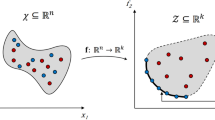Abstract
Particle swarm optimization (PSO) is characterized by a fast convergence, which can lead the algorithms of this class to stagnate in local optima. In this paper, a variant of the standard PSO algorithm is presented, called PSO-2S, based on several initializations in different zones of the search space, using charged particles. This algorithm uses two kinds of swarms, a main one that gathers the best particles of auxiliary ones, initialized several times. The auxiliary swarms are initialized in different areas, then an electrostatic repulsion heuristic is applied in each area to increase its diversity. We analyse the performance of the proposed approach on a testbed made of unimodal and multimodal test functions with and without coordinate rotation and shift. The Lennard-Jones potential problem is also used. The proposed algorithm is compared to several other PSO algorithms on this benchmark. The obtained results show the efficiency of the proposed algorithm.











Similar content being viewed by others
References
Kennedy, J.: A new optimizer using particle swarm theory. In: Proceedings of the Sixth International Symposium on Micro Machine and Human Science, pp. 39–43 (1995)
Shi, Y., Eberhart, R.C.: Empirical study of particle swarm optimization. In: Proceedings of the 1999 Congress on Evolutionary Computation, pp. 1945–1950 (1999)
Eberhart, R.C., Simpson, P.K., Dobbins, R.W.: Evolutionary computation implementations. In: Computational Intelligence PC Tools, pp. 212–226. Academic Press Professional, San Diego (1996)
Shi, Y., Eberhart, R.C.: Fuzzy adaptive particle swarm optimization. In: Proceedings of the Congress on Evolutionary Computation, pp. 101–106 (2001)
Eberhart, R.C., Shi, Y.: Comparing inertia weights and constriction factors in particle swarm optimization. In: Proceedings of the IEEE International Conference on Evolutionary Computation, vol. 1, pp. 84–88 (2000)
Shi, Y., Eberhart, R.C.: A modified particle swarm optimizer. In: Proceedings of the IEEE International Conference on Evolutionary Computation, pp. 69–73 (1998)
Chatterjee, A., Siarry, P.: Nonlinear inertia weight variation for dynamic adaptation in particle swarm optimization. Comput. Oper. Res. 33, 859–871 (2006)
Clerc, M., Kennedy, J.: The particle swarm: explosion, stability, and convergence in a multidimensional complex space. IEEE Trans. Evol. Comput. 6, 58–73 (2002)
Clerc, M.: The swarm and the queen: towards a deterministic and adaptive particle swarm optimization. In: Proceedings of the IEEE Congress on Evolutionary Computation, pp. 1951–1957 (1999)
Kennedy, J.: Small worlds and mega-minds: effects of neighborhood topology on particle swarm performance. In: Proceedings of the Congress on Evolutionary Computation, pp. 1931–1938 (1999)
Kennedy, J., Mendes, R.: Neighborhood topologies in fully informed and best-of-neighborhood particle swarms. IEEE Trans. Syst. Man Cybern., Part C, Appl. Rev. 36(4), 515–519 (2006)
Angeline, P.J.: Using selection to improve particle swarm optimization. In: Proceedings of the IEEE Congress on Evolutionary Computation, pp. 84–89 (1998)
Nakano, S., Ishigame, A., Yasuda, K.: Particle swarm optimization based on the concept of tabu search. In: Proceedings of the IEEE Congress on Evolutionary Computation, pp. 3258–3263 (2007)
Niu, B., Zhu, Y., He, X., Wu, H.: MCPSO: a multi-swarm cooperative particle swarm optimizer. Appl. Math. Comput. 185, 1050–1062 (2007)
Hsieh, S.T., Sun, T.Y., Liu, C.C., Tsai, S.J.: Efficient population utilization strategy for particle swarm optimizer. IEEE Trans. Syst. Man Cybern., Part B, Cybern. 39(2), 444–456 (2009)
Van den Bergh, F., Engelbrecht, A.P.: A cooperative approach to particle swarm optimization. IEEE Trans. Evol. Comput. 8, 225–239 (2004)
Liang, J.J., Qin, A.K.: Comprehensive learning particle swarm optimizer for global optimization of multimodal functions. IEEE Trans. Evol. Comput. 10(3), 281–295 (2006)
Parsopoulos, K.E., Vrahatis, M.N.: UPSO: a unified particle swarm optimization scheme. In: Proceedings of the International Conference of Computational Methods in Sciences and Engineering, vol. 1, pp. 868–873 (2004)
Jiang, Y., Hu, T., Huang, C.C., Wu, X.: An improved particle swarm optimization algorithm. Appl. Math. Comput. 193, 231–239 (2007)
Clerc, M.: Particle Swarm Optimization. ISTE (International Scientific and Technical Encyclopaedia) (2006)
Cooren, Y.: Perfectionnement d’un algorithme adaptatif d’Optimisation par Essaim Particulaire. Applications en génie médical et en électronique. PhD thesis, Université Paris-Est Créteil, France (2008)
Particle Swarm Central. http://particleswarm.info
Conway, J., Sloane, N.: Sphere Packings, Lattices and Groups. Springer, Berlin (1988), 2nd edn. (1993), 3rd edn. (1999)
Lepagnot, J., Nakib, A., Oulhadj, H., Siarry, P.: A new multiagent algorithm for dynamic continuous optimization. Int. J. Appl. Metaheuristic Comput. 1(1), 16–38 (2010)
Tu, Z.G., Yong, L.: A robust stochastic genetic algorithm (StGA) for global numerical optimization. IEEE Trans. Evol. Comput. 8(5), 456–470 (2004)
Yao, X., Liu, Y., Lin, G.M.: Evolutionary programming made faster. IEEE Trans. Evol. Comput. 3(2), 82–102 (1999)
Salomon, R.: Reevaluating genetic algorithm performance under coordinate rotation of benchmark functions. Biosystems 39, 263–278 (1996)
Ellen, F.: Global optimization of Lennard-Jones clusters. PhD thesis, McMaster University, Hamilton, Ontario, 26 February 2002
Hoare, M.R.: Structure and dynamics of simple microclusters. Adv. Chem. Phys. 40, 49–135 (1979)
Author information
Authors and Affiliations
Corresponding author
Rights and permissions
About this article
Cite this article
El Dor, A., Clerc, M. & Siarry, P. A multi-swarm PSO using charged particles in a partitioned search space for continuous optimization. Comput Optim Appl 53, 271–295 (2012). https://doi.org/10.1007/s10589-011-9449-4
Received:
Published:
Issue Date:
DOI: https://doi.org/10.1007/s10589-011-9449-4




